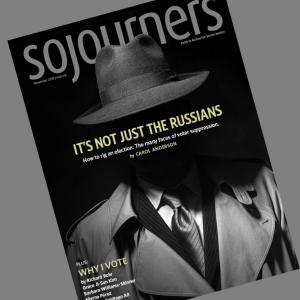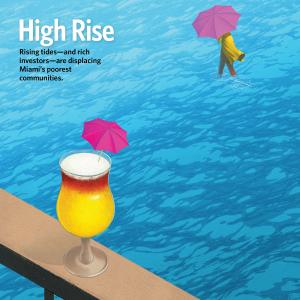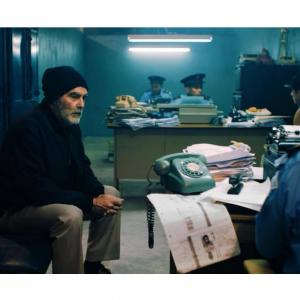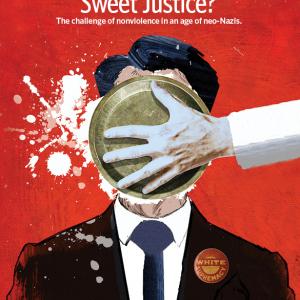Posts By This Author
From the Editors: Voting Counts
HOW MANY WAYS can you say “resist”? In recent issues, we’ve urged people of faith to “challenge,” “subvert,” and “defy” the leaders and systems that run counter to Jesus’ message of abundance, inclusion, and love. We’ve shared stories of faith-fueled ways to “protest, “persist,” and “persevere.” And on more than one occasion, we’ve indulged in the old prophetic standby: “Speak truth to power.”
But the best synonyms for “resist” aren’t in a thesaurus. They’re words like “organize,” “accompany,” and, as we explore in this issue, “vote.” “Voting is simply the easiest part of the whole process for making positive change,” explains Randy Woodley. We agree: Voting should be easy, though as Carol Anderson explains in “It’s Not Just the Russians,” some officials are intentionally restricting voting access, especially for people of color. So don’t be tempted to think your vote is meaningless; it’s the very power of voting that such efforts seek to curtail. If you read nothing else in this issue, read this: Check your local voting guidelines and ensure you cast your ballot on Nov. 6.
New & Noteworthy: September/October 2018
Singing in Exile
On A Liturgy for the Perseverance of the Saints, Taiwanese-American artist SueAnn Shiah reimagines hymns “for those who have been driven out of the church because of their race, gender, or sexuality.” With warm vocals and spare arrangements, Shiah invokes hope for those currently “stranded in the wilderness.” sueannshiah.bandcamp.com
Faith and Imagination
In A Light So Lovely: The Spiritual Legacy of Madeleine L’Engle, Sarah Arthur digs deep into the personal journey of the influential and sometimes controversial A Wrinkle in Time author, revealing what L’Engle can continue to teach us. Zondervan
Letters: September/October 2018
Letters to editors from Sojourners readers.
Turning Off the Friday Night Lights
FORMER SAN FRANCISCO 49ers quarterback Colin Kaepernick was presented Amnesty International’s Ambassador of Conscience award this spring—previous winners have included Nobel Prize winners such as Nelson Mandela and Malala Yousafzai—for “his refusal to ignore or accept racial discrimination.” Kaepernick’s “take a knee” protests against police violence sparked a movement, across football and other sports, and they rest upon a rich tradition of athletes who have stood up for justice in the broader society.
Our cover feature this month looks at one of the pre-eminent justice issues for the players themselves, particularly in football: brain injuries. We talked with Dr. Bennet Omalu, the forensic pathologist who discovered pervasive brain trauma in NFL players. Omalu, whose research on chronic traumatic encephalopathy, or CTE, was chronicled in the 2015 Will Smith movie Concussion, argues in his latest book, Brain Damage in Contact Sports, that no child under 18 should play football.
Letters: August 2018
Letters to the editors from Sojourners readers
New & Noteworthy: August 2018

Image via Cora Edwards Photography/ Facebook
Time to Test
The documentary film I Am Evidence sheds light on the growing number of untested rape kits in the U.S. Featuring testimonies of survivors, prosecutors, and advocates, the documentary investigates why this backlog exists and calls attention to those fighting for justice. HBO
Beyond Redemption?
Fifteen years ago, Bryan Bliss witnessed an execution that propelled him to seminary, a stint teaching classes at correctional facilities, and, ultimately, into writing We’ll Fly Away. This young adult novel tells the story of two friends, Luke and Toby, through Luke’s letters from death row. Greenwillow Books
Holy Grief
EARLIER THIS YEAR, we lost theologian James H. Cone. “Yes, he was a world historical figure in contemporary theology, no doubt about that,” said professor Cornel West at Cone’s funeral, “a towering prophetic figure engaging in his mighty critiques and indictments of contemporary Christendom from the vantage point of the least of these ... But oh,” West added. “I think he would want us to view him through the lens of the cross—the blood at the foot of that cross.”
More than any other theologian, Cone taught us that we cannot divorce the gospel—Jesus’ suffering and redemption—from the history of violence against black people in the U.S. “Until we can see the cross and the lynching tree together, until we can identify Christ with a ‘recrucified’ black body hanging from a lynching tree, there can be no genuine understanding of Christian identity in America,” wrote Cone in The Cross and the Lynching Tree, “and no deliverance from the brutal legacy of slavery and white supremacy.”
The same week Cone died, the Equal Justice Initiative opened the National Memorial for Peace and Justice in Montgomery, Ala., the nation’s first memorial dedicated to the more than 4,400 victims of racial violence, including lynching, between 1877 and 1950.
New & Noteworthy: July 2018
Dignity in Displacement
Struck by the tragic stories of immigrants trying to enter eastern and southern Europe, Patrick Chamoiseau, a French author from Martinique, explores what it means to be a global community in a time of mass displacement in Migrant Brothers: A Poet’s Declaration of Human Dignity. Yale University Press
Silent Grief
Based on real events, September (originally released as Septiembre, Un Llanto En Silencio) depicts the coming-of-age of Theresa, a young girl who loses her hearing during a guerrilla terrorist bombing in Guatemala. Guatemalan director Kenneth Müller captures Theresa’s struggle as she navigates a grieving nation. Netflix
Letters: July 2018
Seeking Alternatives
David LaGrand’s commentary “Imprisoned by Poverty” (May 2018) calls attention to an issue with our justice system, namely how bail can create severe problems for people who cannot come up with the necessary funds. This leads me to a practical question. We often hear reports of model bills that the American Legislative Exchange Council is presenting to state legislatures, trying to get undesirable policy made into law. My question is: Is there a good alternative to ALEC?
Conversations Worth Having
EVERY SUMMER, we pause our magazine work to spend a few days at The Summit for Change, a gathering of faith and justice leaders hosted by Sojourners. Held at historic Gallaudet University, The Summit is Sojourners’ homecoming for old friends and new and also a time to practice two overlooked justice activities: honoring and blessing.
The first group of people we honor at The Summit are elders, leaders who’ve paved the way for us to follow. The elders we’ve honored over the years—including Rep. John Lewis, Marie Dennis, Walter Brueggemann, Ruby Sales, John Perkins—are heroes. We thank them for their pioneering leadership, learn from their wisdom, and ask for their blessing on our own work.
But we also honor new leaders—folks whose names may not be widely known but whose commitment to social justice is unmistakable. We recognize them for their efforts to create a more equitable and peaceful world before we offer our blessing on their work that lies ahead.
Is It Okay to Punch a Neo-Nazi?
NEO-NAZIS AND WHITE SUPREMACISTS are marching again. Counterprotesters are opposing and disrupting. Where do Christians stand? In April, Sojourners senior associate editor Rose Marie Berger launched this question on social media: Is it okay for a Christian to punch a Nazi? A lively conversation followed, eventually generating nearly 100 replies—and about as many different understandings (and misunderstandings) of Christian nonviolence. Excerpts from the conversation below are edited and used with permission. —The Editors
Rose: Is it okay for a Christian to punch a Nazi? Discuss.
Maureen: Last time I checked it is not okay to punch anyone, no matter who you are. Right?
Nate: Yes. Pacifism doesn’t work against genocide. You have to have an opponent who can feel shame. Nazis call for the extinction of my people and have proven they are willing to try and carry that out.
Rose: Is pacifism the same as organized unarmed resistance?
Nate: In my head it has the same results against Nazis. Nazis are my only punching exception.
Larry: Ask Dietrich Bonhoeffer ...
Nate: Show me where Bonhoeffer succeeded in stopping the Nazis. I’ll wait.
Larry: He didn’t, but he didn’t resist passively.
Korla: Choosing to accept death for yourself is substantially different from choosing to accept it for other people, particularly from a position where you’re incredibly low on the list of targets. That’s cowardly and colonial.
New & Noteworthy: June 2018
Four culture recommendations from the editors.
Letters to the Editor
Unfounded Intimations?
Responding to the recent Sojourners article by Ryan Rodrick Beiler (“Undeterred by the Facts,” February 2017) regarding the arrest and detention of World Vision Gaza Director Mohammed el-Halabi, I would like to clarify the following pertinent issues.
El-Halabi has been indicted on charges of membership in a terror organization, use of material goods for terror, providing intelligence and material aid to the enemy in wartime, and illegal possession of arms and ammunition. If a plea deal will not be agreed between the sides, the Israeli state prosecution will present evidence on all these charges in a manner consistent with due process, fair trial, and maximum possible transparency given security considerations.
Hence, it is hard to understand Rodrick Beiler’s conclusion that Israel is “undeterred by the facts.” The case will move forward based only on evidentiary fact. Beiler also questions why Israel would level such charges against a Christian aid organization. The only reason is that, unfortunately, due to lack of adequate oversight, the charges appear to be true. This is probably why Western donor countries have suspended aid to World Vision Gaza operations pending trial.
We also reject and totally deny the unfounded intimations in Rodrick Beiler’s report that el-Halabi has been mistreated in Israeli custody. This is not the case. El-Halabi has also had access at all times to professional medical care and has been visited by his attorneys and family.
Itai Bardov
Embassy of Israel
Washington, D.C.
Ryan Rodrick Beiler Responds:
Itai Bardov writes at length about the fair trial that Mohammed el-Halabi will be granted by the Israeli legal system. He then declares that “the charges appear to be true.” This is consistent with the Israeli foreign ministry’s campaign, as described in my article, to hype el-Halabi’s presumed guilt long before due process has had the chance to take its course.
Recent and extensive documentation by international, Israeli, and Palestinian human rights organizations (Amnesty International, Human Rights Watch, B’Tselem, Al Haq, and others) has indicated routine use of torture and other forms of abuse of Palestinians within the Israeli legal system, adding credibility to el-Halabi’s allegations of such treatment.
Regarding el-Halabi’s alleged crimes, and the claim that “Western donor countries have suspended aid” to World Vision, I would direct Bardov to the recent investigation conducted by the Australian government’s Department of Foreign Affairs and Trade, which “uncovered nothing to suggest any diversion of government funds” on the part of el-Halabi.
While it is doubtful that the Israeli legal system will offer el-Halabi a “fair trial and maximum possible transparency,” as Bardov claims, it is certain that World Vision, the Australian government, and the international human rights community present a very different narrative from that offered by Netanyahu’s right-wing Israeli government. Whom will you believe?
Correction: Our May 2017 issue credited climate change research to the Yale Program on Climate Change Communication. The surveys were actually a partnership between George Mason University’s Center for Climate Change Communication and the Yale program.
“On the other hand…” Write to letters@sojo.net or Letters, Sojourners, 408 C Street NE, Washington, DC 20002. Include your name, city, and state. Letters may be edited.
Letters to the Editor
Unchaining Hope
Thank you for uplifting one of North America’s most prophetic and inspirational persons of our time, Daniel Berrigan, SJ (“The Unchained Life of Daniel Berrigan,” August 2016). He was one of the most hopeful people for change in a time and an era when many of us felt little hope for change in the status quo. I never met him personally but was inspired by both who he was as a person and his commitment to a theology of personal involvement and activism for peacemaking.
John Fogleman
Ontario, Canada
Shame and Blame
Jim Wallis’ analysis of “intersectionality” (“The Categories That Divide Humanity,” July 2016) felt to me like an attack on local, traditional cultures, particularly those that are “white.” As a lifelong rural pastor, I know well the propensity of rural communities toward ethnocentrism. And within the context of American society, all white traditional cultures certainly bear the burden of racism. But the solution is not to dismantle all local, traditional cultures, but to fashion communities that value their heritage along with the heritage of all other cultures. Wallis’ shame-and-blame language not only fails to effect positive change in local, traditional cultures but also may well be the kind of “politically correct” discourse that drives traditional “whites” to embrace political demagogues.
S. Roy Kaufman
Freeman, South Dakota
New & Noteworthy

Image via Picturebookmakers.com
Wherever You Go ...
In Why Am I Here?, by Constance Ørbeck-Nilssen and Akin Duzakin, a picture book for ages 5 to 9, a child ponders the many different places she could be: a huge city, an isolated forest, a war zone, fleeing to a strange land. A book that encourages empathy and acknowledges the big questions that kids ask themselves. Eerdmans
Faith for the Struggle
Shannon Daley-Harris, religious affairs adviser for the Children’s Defense Fund, offers scriptural meditations to inspire and sustain advocates and nurturers in Hope for the Future: Answering God’s Call to Justice for Our Children. Includes questions for faithful response. Westminster John Knox
No Easy Road
Activist and artist Anthony Papa writes about the challenges of rebuilding his life after serving 12 years for a nonviolent drug offense, his work to change oppressive drug-sentencing laws, and memories of prison in This Side of Freedom: Life After Clemency. 15yearstolife.com
Life Out of Death
“I did not understand how people changed so much: Some became executioners, others became victims,” writes Holocaust survivor Magda Hollander-Lafon in Four Scraps of Bread, a slim volume of piercing, simple-yet-profound reflections on her journey through hell and back. Notre Dame Press
Having Our Cake?
IN THE TERM that begins this fall, the Supreme Court will hear the case of Masterpiece Cakeshop v. Colorado Civil Rights Commission. The nine justices will decide: Is a baker with sincerely held religious objections to same-sex marriage obliged—by anti-discrimination laws—to bake a wedding cake for a same-sex couple?
But underneath the frosting, the case exemplifies a much broader conversation in which religious liberty is pitted against civil liberties. In this ongoing fight, sides are often split down partisan lines, with conservatives championing religious liberty and liberals defending civil rights.
This religious-freedom-vs.-civil-liberties split is frustrating to many. After all, religious liberty isn’t just for conservatives; the First Amendment offers important protections to all people of faith, from Muslims who seek permits to build mosques to Christians who are conscientious objectors to war. At the same time, we care deeply about civil rights, especially in an era when so many Americans face discrimination because of their gender, sexual orientation, race, or ethnicity. In a nutshell, we want to support religious freedom for all while also protecting the civil liberties of LGBTQ folks and other minorities. But is that even possible?
Baptist minister and constitutional lawyer Oliver Thomas is optimistic, but not naive. In “Clash of Liberties,” he explains how religious liberty laws morphed from bipartisan efforts to ensure religious liberty for all into tools used by conservatives and liberals alike to press their own advantage. If we’re serious about protecting both, Thomas writes, we’re going to have to do something that’s easier said than done: lay aside our ideological differences and work for the common good.
Seven Elements of Just Peace

Ivonne Wierink / Shutterstock
In April 2016, Roman Catholics from around the world gathered at the Vatican to discuss how the church might embrace the principles of nonviolence and just peace more deeply (see "Game Changer?" in the December 2016 issue of Sojourners.)
And what does "just peace" include? Here are seven key principles:
Just cause: protecting, defending, and restoring the fundamental dignity of all human life and the common good
Right intention: aiming to create a positive peace
Participatory process: respecting human dignity by including societal stakeholders—state and nonstate actors as well as previous parties to the conflict
Right relationship: creating or restoring just social relationships both vertically and horizontally; strategic systemic change requires that horizontal and vertical relationships move in tandem on an equal basis
Reconciliation: a concept of justice that envisions a holistic healing of the wounds of war
Restoration: repair of the material, psychological, and spiritual human infrastructure
Sustainability: developing structures that can help peace endure over time
Adapted from “What Kind of Peace Do We Seek?” by Maryann Cusimano Love, associate professor of international relations at the Catholic University of America, in Peacebuilding (Orbis Books, 2010).
New & Noteworthy

Courtesy of Facebook.com/jamesbaldwinmovie
Righteous Rage
For the critically acclaimed film I Am Not Your Negro, filmmaker Raoul Peck drew upon an unfinished manuscript by writer James Baldwin and archival footage to fashion a searing narration about race in America. Opens in theaters in February. Magnolia Pictures
People of the Book
In Islam: What Non-Muslims Should Know, John Kaltner, a Rhodes College professor of Muslim-Christian relations, explains the basics of Islam, including frequently misunderstood practices. Originally released in 2003, this is a newly revised and expanded edition. Fortress Press
Multiplying Gifts
A Chicago church divided a financial windfall among its members, $500 each, telling them to use it to do good in God’s world. Laura Sumner Truax and Amalya Campbell tell the practical and inspiring lessons learned in Love Let Go: Radical Generosity for the Real World. Wm. B. Eerdmans
Displaced Prophets
Mishwar Music , by The Homsies, is a three-song EP recorded in a refugee camp in Akkar, Lebanon, with a team of youth from Homs, Syria. It is available for download on Bandcamp. mishwar.org
New & Noteworthy

A scene from outside the Pulse nightclub, October 2016. Miami2you / Shutterstock.com
Piety’s Dark Side
Love the Sinner is a short documentary narrated by queer filmmaker Jessica Devaney, who grew up in a conservative evangelical church. In the wake of the 2016 Pulse nightclub shooting, she takes a hard look at the connection between Christianity and homophobia. lovethesinnerfilm.com
Crisis and Conscience
Simone Campbell, Kelly Brown Douglas, Jacqueline M. Hildago, George “Tink” Tinker, Kwok Pui-lan, Jim Wallis, and others write about the “confessional crisis” of our political era and possible faithful responses in Faith and Resistance in the Age of Trump. Edited by Miguel A. De La Torre. Orbis
A Lifetime Adventure
Calling All Years Good: Christian Vocation throughout Life’s Seasons explores calling as something we wrestle with not just as young adults but “from infancy to old age,” combining social science insights with practical theology. Edited by Kathleen A. Cahalan and Bonnie J. Miller-McLemore. Eerdmans
Hard-Won Wisdom
John M. Perkins, co-founder of the Christian Community Development Association, has spent decades working for a gospel that is inseparable from racial and economic justice. In the memoir Dream With Me: Race, Love, and the Struggle We Must Win, he reminds us, “It all comes down to love.” Baker Books
Letters to the Editor

Everett Historical / Shutterstock
Gimme Shelter
I was glad to see “Convicted of the Gospel” by Darlene Nicgorski included in the September/October issue. The “ministry of sanctuary” that she mentioned is an important and timely way to show the world we are Christians through our love. I have been lobbying my members of Congress and letting them know why my faith motivates my advocacy. The faith voice is crucial to immigration reform’s success and is necessary if we want any reforms to reflect our beliefs in human dignity, equality, and justice. I hope that the church around the country will join in the sanctuary movement, whether it is through advocacy, charity, or sheltering those who face the immediate threat of deportation.
Thomas Cassidy
Norman, Oklahoma
Base Values
You cannot reform the police state or our culture of incarceration (“Black and Blue,” by Ryan Hammill, September/October 2016) without a critique of our country’s values that proliferate fear and aggression. It’s how we were built and how we’ve sustained our way of life. Until then, taxpayers need to demand transparency from law enforcement, stop the flow of tax dollars to militarize them, and advocate for laws to protect citizens—especially citizens of color.
Tamara Cedre
via Facebook
Prophets On the Loose
I read about the Tennessee weapons plant protest (“An 82-Year-Old Nun Did What?” by Rosalie Riegle, September/October 2016) in the news when it happened. I appreciate the update. I did not know that the “prophets of Oak Ridge” were released. Few realize the danger we all face; nuclear war cannot be allowed to happen. Pray for peace and the destruction of these weapons.
Jim Halliday
Lafayette, Georgia










